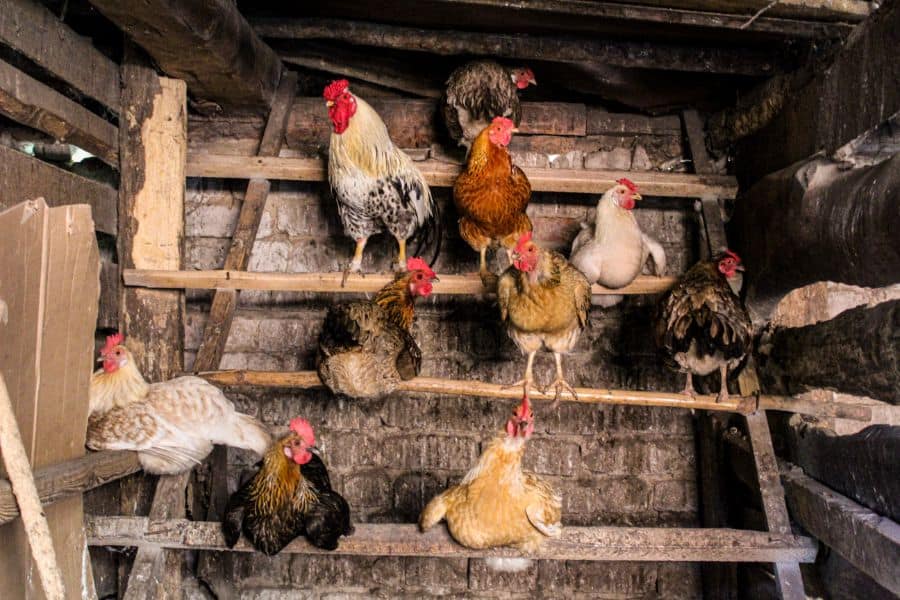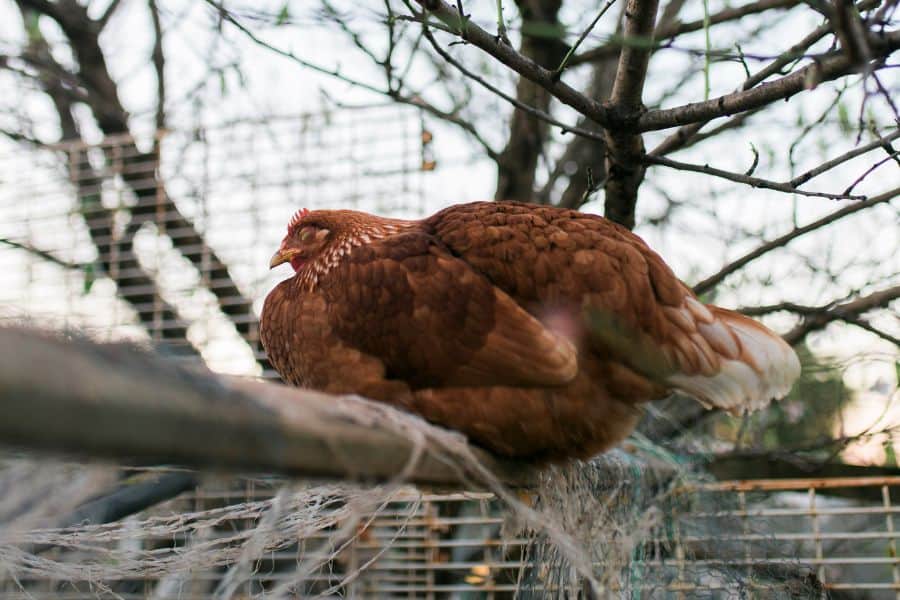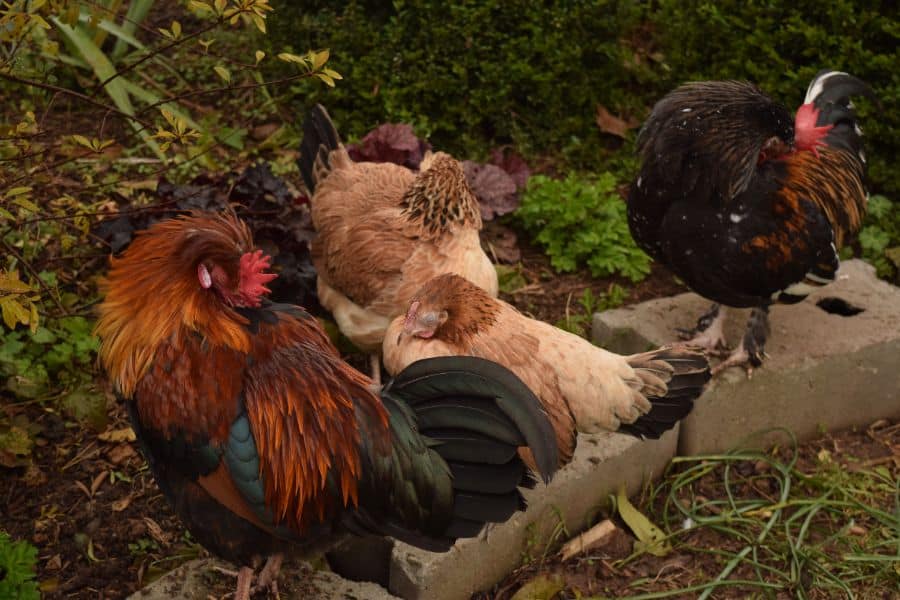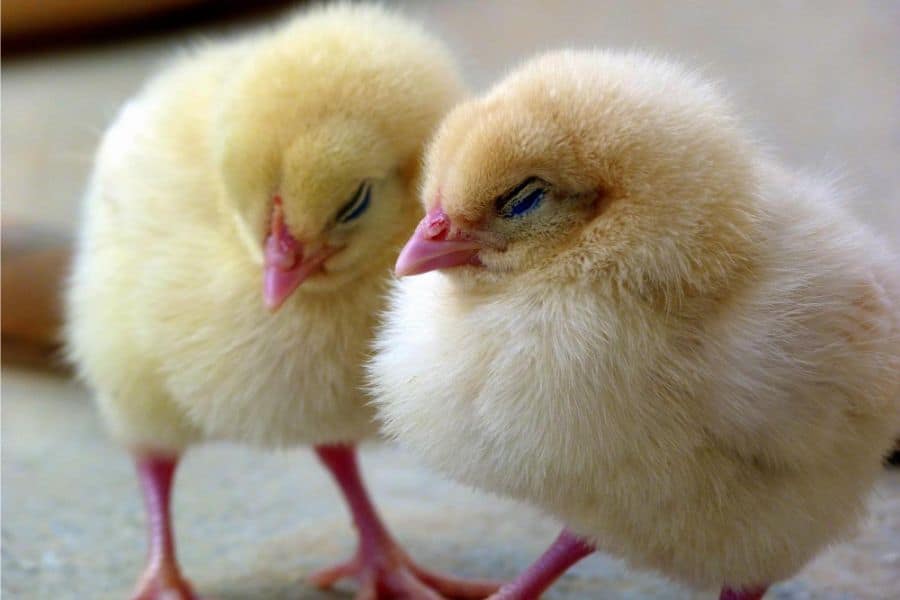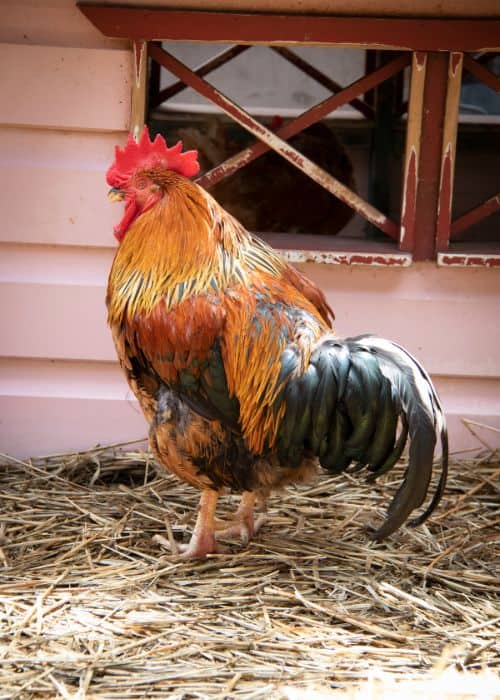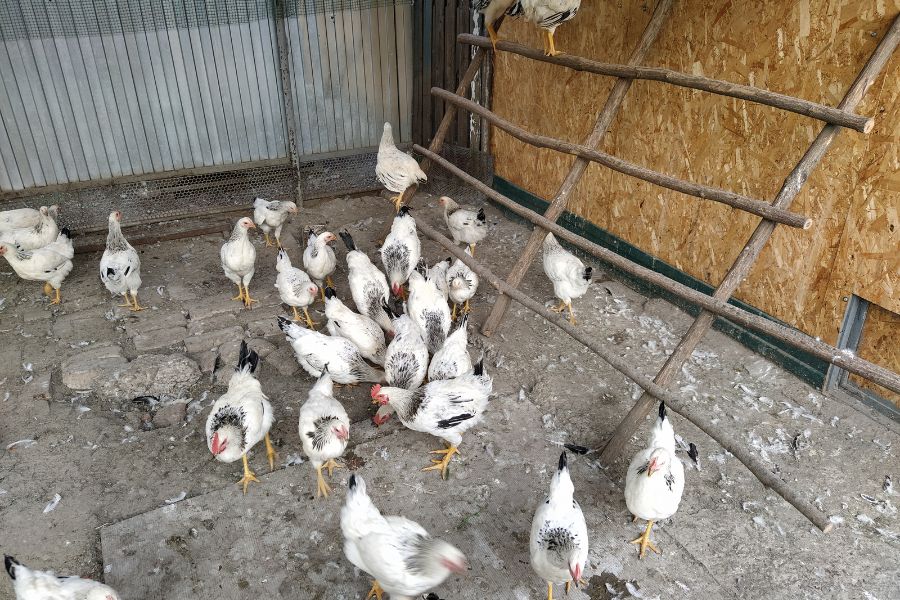How do chickens sleep, and where, and for how long?
Plenty of sleep will keep your birds fit and healthy, so let’s learn about the bedtime routine of chickens!
Chickens sleep by sitting on a raised perch or roost, staying securely in place using a tendon-locking mechanism that helps them grip the roosting bar with their toes.
Do Chickens Sleep?
Like the vast majority of animals, chickens need to sleep every day. In fact, their sleep pattern is very like humans, as they sleep mostly through the darkness of night.
Sleeping is an essential part of life for chickens. Enough sleep enables them to conserve energy whilst replenishing the body’s stores of essential nutrients.
A good night’s sleep helps both the mind and body recover, preparing your chickens for the day ahead.
Without adequate levels of sleep, a chicken would become very sick indeed. Sleep deprivation can lead to reduced immunity and serious health problems in chickens.
So, the best way to keep your chickens healthy is to provide them with the perfect conditions for a good night’s sleep.
Fun fact: not only do chickens sleep, but experts believe that they may also dream!
Dreaming occurs during a type of deep sleep called rapid eye movement (REM) sleep. Studies have shown that chickens experience this type of sleep, but unfortunately, we don’t yet know what they dream about.
How Do Chickens Sleep?
Chickens sleep perched on a roost at night. They sit down on the roost, with their toes locked in position to hold them securely in place.
The natural instinct of chickens is to roost at night – this means they jump or fly up onto a higher object where they will sleep.
The reason for roosting is that nighttime is a dangerous time for a chicken. They cannot see well in the dark and are at the greatest risk of predator attacks during this time.
Sleeping in an elevated position, high above the ground, makes a sleeping chicken harder for a predator to find. In the wild, a chicken would fly up into the branches of a tree to roost at night.
In domesticated chickens, the desire to roost remains, even though we keep them in enclosures that protect them from predators. This means that chickens still need a suitable place to roost and sleep at night.
If a suitable roosting spot is not available, chickens can and will sleep on the floor, normally by nestling into a comfortable bed of hay or woodshavings.
Many chicken owners successfully keep chickens in this way, but studies have shown that chickens that do not roost at night are at a higher risk of various health problems. In some countries, it is a mandatory part of animal welfare regulations to provide chickens with a suitable place to roost.
Chickens that sleep on the floor of the coop will inhale dust and spores from the bedding, increasing the risk of respiratory problems. Chickens that perch at night are less likely to suffer from foot and leg problems, and roosting behavior also reduces the risk of bullying in your flock.
Another good reason for sleeping in an elevated position is that chickens pass droppings as they sleep. Chickens that sleep on the floor can end up with soiled feathers and sore skin if the coop is not kept clean and free from droppings.
One time you may come across a chicken that sleeps on the ground is when a hen goes broody. At this time, she needs to spend all her time sitting on her clutch of eggs to keep them warm, so she will give up her place on the roost and sleep in the nesting box instead.
Do Chickens Sleep Standing Up?
While chickens do sleep in an upright position on a perch or roost, they are not exactly standing up. But if this is the case, how do they stay balanced on the roosting bars while they are asleep?
Chickens have an incredibly clever tendon-locking mechanism in their legs. This holds the bird securely in place on the roost, even when they are fast asleep.
If you ever watch a chicken getting comfortable for the night, it will fly or jump onto the perch, then gently sit down. As the legs bend, the tendons in the toes contract, curling them downwards around the perch.
So, as long as the chicken stays sat down, the toes will remain tightly gripped onto the perch. Clever stuff!
Fun Fact: During the day, certain chickens may sleep standing up when they are tired, more precisely referred to as taking a brief nap.
Where Do Chickens Sleep?
The position of chickens on the roost is key when it comes to their social behavior and hierarchy.
The dominant hen and the rooster will occupy the best positions on the roost, normally at the highest spot. The remaining hens will jostle for positions closest to these two top birds.
How closely they sleep together will vary depending on the weather. During the colder months, they huddle together for warmth, whilst in the summer they will be more spread out.
Interestingly, chickens also alter their positions on the perch through the night. They start by sleeping huddled closely together, but as the night progresses they start to spread further out.
Do Chickens Sleep With Their Eyes Open?
When a chicken is fully asleep, it will have both of its eyes closed. However, during periods of light sleep, it is very common to see a chicken asleep with one eye open.
This is a remarkable survival strategy – many birds, including chickens, can sleep with only one-half of the brain. During periods of light sleep the other half of the brain stays awake, with the corresponding opposite eye open.
As the chicken descends into a period of deep REM sleep, it will need to close both eyes as the brain will be fully asleep.
Interestingly, when a group of chickens roosts together, chickens on the outer edges of the perch are more likely to sleep with one eye open. Almost like they are standing guard over their sleeping companions!
How Do Chicks Sleep?
For the first few weeks of life, chicks will sleep on the ground, tightly nestled under their mother or with other chicks. They huddle together for warmth and comfort, as they cannot regulate their body temperature as effectively at this young age.
As chicks grow and develop at a very rapid rate, they need a lot more sleep than adult birds. It is not unusual to see a chick taking a power nap in the middle of the day, normally under the watchful eye of the mother hen.
When the chicks are around three weeks old, they will start to jump up onto low perches to roost at night.
If they have been raised with a broody hen she will encourage them to roost when the time is right. However, even chicks without a mother will instinctively figure out how to roost.
At this young age, chicks cannot fly very high, so they need lower, smaller perches to roost on. As they grow older, they will gradually move up to the adult perches to sleep.
How Long Do Chickens Sleep For?
Chickens will start roosting as the sun sets, gradually settling down for the night as daylight levels fall. They then sleep right through until around half an hour before dawn.
However, how long chickens sleep for will depend on how many hours of darkness there are. During the summer months, they may get seven hours of sleep per night or even less. In the winter, this can increase to nearly double the time spent asleep.
As the time that chickens go to bed is determined by daylight levels, they tend to go up to roost earlier on dull, cloudy days. On a bright sunny day, they will stay out as late as possible, enjoying every last minute of the day!
Do Chickens Sleep During The Day?
Chickens will mostly sleep at night, but they can also have short periods of rest during the day. These daytime naps are normally taken on the ground or standing up, in a favorite sunny spot, rather than on the roost.
Another time you may see a chicken relaxing during the day is when they take a dust bath. This is an essential part of their well-being, and a happy hen will often have a little rest once she has finished grooming herself.
How To Set Up A Perch For Your Chickens
Chickens spend up to half their lives sleeping! So, getting the roosting area just right is vital for maintaining their health and well-being.
Perches should be located within a secure coop, which is well-ventilated and safe from predators.
Position them in an area away from nesting boxes and food and water containers. Ensure there is easy access under the perches to clean away the inevitable pile of droppings your sleeping chickens will produce.
You will need to provide sufficient space for all your chickens to roost comfortably. Animal welfare regulations state that each bird should have at least six inches of perch, but most backyard chicken keepers allow for at least twice this amount.
The roosting bars should be flat or slightly rounded, and at least two inches in diameter. Many people use wooden branches or planks, but studies have shown that rubber-coated perches may reduce the risk of leg injuries.
For a small flock of chickens, a single roosting bar may be sufficient. If you need to use more than one roosting bar, place them in a tiered system, not directly over each other.
Conclusion
It is clear to see that chickens need their beauty sleep as much as we humans! By providing your birds with the optimum sleeping conditions, you give them the best possible chance of having a restful night’s sleep.
